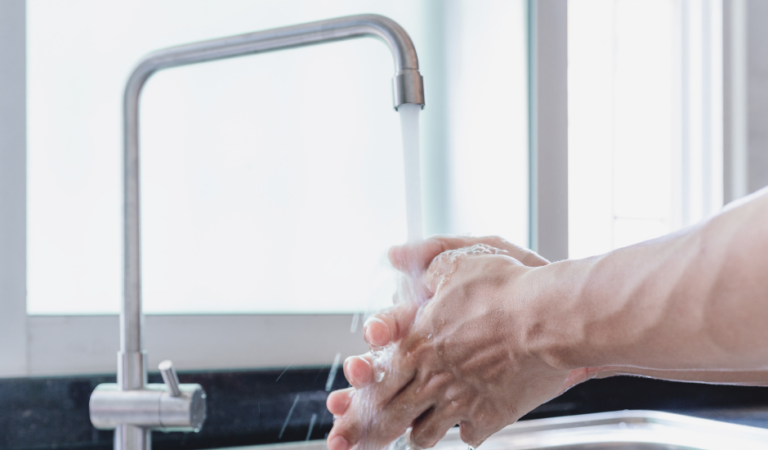 20th October 2021
20th October 2021The Consequence of Poor Water Hygiene in Buildings
If you are a building owner, landlord or someone in control of the premises, you are responsible for the water hygiene and must understand the risks that come with poor water hygiene.
In this blog, we are going to outline the consequence of poor water hygiene in buildings and share our advice on how to prevent poor water hygiene in your buildings.
Disease And Illness
Disease, illness and even death is the most serious consequence of poor water hygiene in buildings.
Manmade water systems, including cooling towers, water tanks and hot and cold water systems are usually responsible for maintaining potable water. If preventative measures are not put in place, this water is at risk of being contaminated with Legionella.
Legionellosis is a collective term for diseases caused by legionella bacteria. Legionnaire’s disease is the most serious of the diseases and can be fatal if not treated properly. The disease is a form of pneumonia that can infect anyone and is more problematic for certain types of people, including:
- Those over 45 years of age
- smokers and heavy drinkers
- those suffering from chronic respiratory or kidney disease, diabetes, lung and heart disease
- anyone with an impaired immune system.
Pontiac fever and Lochgoilhead fever are less serious conditions caused by legionella bacteria.
Although legionella bacteria are widespread in natural water systems, such as lakes and ponds, the conditions are rarely right for them to infect people. Instead, outbreaks of Legionnaire’s disease are usually linked to purpose-built water systems.
If not properly managed, purpose-built water systems can reach conditions that encourage legionella growth. Once the water is inhaled or consumed, people are at serious risk of contracting the disease.

Health And Safety Breaches
Because the health risks of poor water hygiene are so serious, there are laws and legislation in place that must be adhered to. Business owners, landlords and people in control of premises can even face prosecution for breaching health and safety laws. And the building can face closure.
If the advice set out in the ACOP L8 code, Health and Safety at Work Act 1974 and the Control of Substances Hazardous to Health Regulations 2002 is not adhered to, the building owner or landlord can face prosecution.
ACOP L8 is the Approved Code of Practice and guidance. Entitled ‘Legionnaires’ disease. The control of legionella bacteria in water systems’, the guidance is aimed at building owners, employers, those in control of premises and those with health and safety responsibilities for others, to help them comply with their legal duties in relation to legionella.
If you are the building owner, landlord, business owner or person in charge of the property, you are responsible for:
- identify and assess sources of risk
- manage any risks
- prevent or control any risks
- keep and maintain the correct records
- carry out any other duties you may have
How To Prevent Poor Water Hygiene
To avoid the consequences of poor water hygiene, you should have a Legionella prevention and management plan in place, which includes a water hygiene risk assessment.
A risk assessment is crucial as it identifies any potential problems before they escalate. Water hygiene risk assessments should always be carried out by a professional water hygiene specialist such as Clarion Water. If the risk assessment identifies any issues, the water hygiene contractor can survey the problem and propose corrective options.
Aside from carrying out risk assessments, you should also ensure that all potable water is stored at the right temperature in a structurally sound water tank or cooling tower.
Water Hygiene Services By Clarion Water
At Clarion Water, we work with businesses and building owners across the UK.
From assessing risk to putting systems in place to ensure that your water hygiene and legionella requirements are compliant with ACOP L8 Legislation, we offer a full range of services. This includes Legionella prevention services, which include:
- Description of the system
- Training of key personnel
- Identified potential risk sources
- Means of preventing the risk or controls in place
- Monitoring, inspection and maintenance procedures
- Records of the monitoring results and inspection checks carried out
- Full schematic diagram of the water system in place
- Arrangements to review the risk assessment regularly
Our thorough risk assessment includes a site survey and assessment of all domestic water systems by one or two of our experienced and qualified assessors.
If issues are identified with the water, our team will complete an in-depth survey of the problem there and then. We will then put a proposal together for the various options along with costings.
Aside from Legionella prevention and water hygiene management, the services at Clarion Water include water tank repair and reline, water tank modification, water tank installation and water tank replacement. We also offer cleaning and disinfection of domestic water systems.
Get In Touch
Take control of your water hygiene with Clarion Water today. You can call us on 0113 229 5062, email us at info@clarionwater.co.uk or fill out our online contact form.